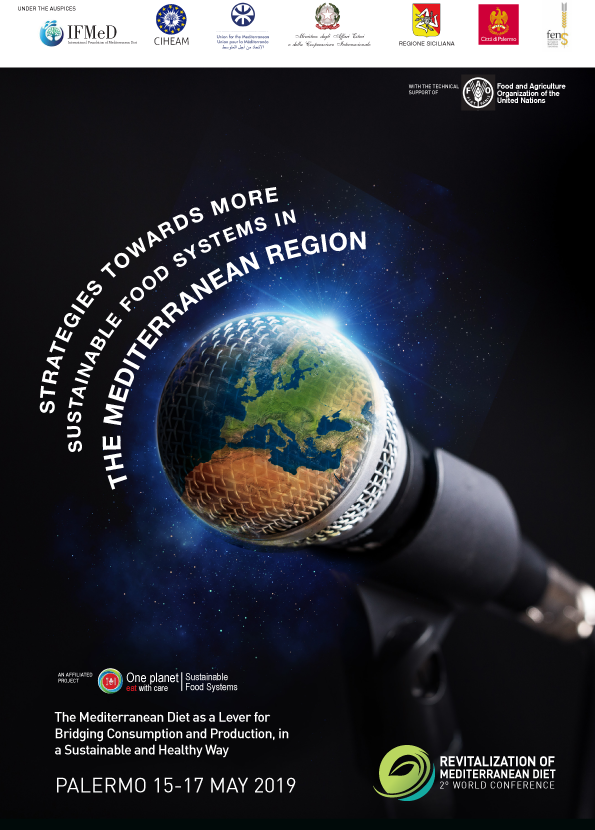The Second World Conference, by enhancing innovative inter-sectorial and multi-stakeholder dialogues linking food consumption to food production, towards more sustainable food systems in the Mediterranean area, will provide a broader multi perspective understanding of the multiplex sustainable benefits of the Mediterranean diet model, within the diversity of the Mediterranean food cultures and food systems, in order to revitalize it

Summary and key messages from the Session 10
The Challenge of Organic Food Systems in the Mediterranean
Co-chaired by
Denis Lairon, Aix-Marseille University and Organic Food System Programme, and
Flavio Paoletti, Council for agricultural research and economics and Organic Food System Programme
The objective of the Session 10 was to provide scientific evidences and real-world examples about how the organic food system can contribute to the sustainability of food systems in the Mediterranean
Session 10 was composed of six presentations by speakers with different expertise and sounded experience in organic:
- Jostein Hertwig, Organic Food System Programme.
“Organic Food System Programme. A Core Initiative of United Nations One Planet network – background and how it can contribute to the revitalization of the Mediterranean Diet”
- Patrizia Pugliese, CIHEAM – Bari and Mediterranean Organic Agriculture Network
“Organic agriculture in the Mediterranean region: latest facts and figures”
- Salvatore Basile, International Network of Eco-Regions
“The Bio-districts as an example of local and sustainable food systems”
- Samia Maamer, Ministère de l’Agriculture, de Ressources Hydraulique et de la Péche – Tunis
“The organic strategy in Tunisia. Approaches and plans for the creation of bio-territories”
- Jane G. Hanna, Heliopolis University for Sustainable Development – Cairo
“SEKEM, a 40 Years Model for Organic Agriculture and Sustainable Development in Egypt”
- Denis Lairon, Aix-Marseille University and Organic Food System Programme
“Organic food consumption patterns: a link between sustainable food consumption and production: data from the French Nutrinet-Santé cohort study”
A transition of the current food system towards sustainability is urgently needed in the Mediterranean. This transition requires social, institutional, technological innovations. Taking into account the socio-cultural and biological aspects of the Mediterranean Area, a new food system approach is needed based on human, natural and social resources.
The presentations in the Session 10 were addressed to show how the organic food system represents an answer to this need.
Key messages drawn from the presentations and discussion in Session 10 and reported in Session 18 as inputs to the Conclusion of the Conference
- Organic is an example of global sustainable food system. It is science-based. 100 years of practical experience in production, processing and consumption. Data on certified organic agriculture are recorded annually in more than 170 countries. Organic is defined at the regulatory level in more than 80 countries.
- Organic production has been scientifically proven to be sustainable. It enhances biodiversity, reduces water pollution, improves soil quality and fertility, increases farmers income.
- Recent studies have shown that regular organic consumers have plant-based, Mediterranean-type diet with significant reduction of obesity and some non-communicable diseases. This consumption pattern is linked to reduced land and energy use and GHG emissions. It means that regular organic food consumers make healthy and sustainable food choices.
- Organic food system may offer operational examples of “living laboratories” for the needed transformation processes. In the Mediterranean region, local sustainable organic food system, such as bio-districts/eco-regions/bio-territories, exist or are near to be established. The Bio-districts or Eco-Regions, such as the “Biodistretto Cilento”, are territories where farmers, consumers, public authorities and other local actors realize an agreement aimed at the sustainable management of local resources, based on organic farming and agroecology. SEKEM is a model where mankind is living in social forms reflecting human dignity; and where all economic activities are conducted in accordance with ecological and ethical principles. SEKEM founded Heliopolis University to provide a place where new ideas meet fertile ground for research and innovation. Bio-territories in Tunisia are intended to be a successful example of economic development by integrating organic to sustainable regional development as a dynamic generator to economic components (bio-tourism, crafts, industry, culture, health, etc.) and a model for south-south cooperation.
- Organic agriculture in the Mediterranean (11% of the world organic agricultural area in 2017, according to MOAN’s latest report) represents quite a broad, diverse and dynamic community made of many smallholder farmers, responsible consumers and companies, dedicated associations, professionals and researchers and committed institutions. Even though in some countries organics has not yet a full institutional recognition, in many others it is a very well established sector; domestic market is still limited in many countries but across the region, niche marketing channels co-exist with mainstream and top-end market outlets as well as with new ventures focusing on product innovation or social innovation; also growing export volumes and values contribute to give visibility to the sector. This organic community can give a valuable contribution to the sustainability debate in the Mediterranean and is ready to establish alliances and partnerships with other sustainability initiatives and actors sharing the same values.
- A networking action is necessary to connect the local sustainable organic food systems in the Mediterranean, in order to create horizontal networks within which they can exchange knowledge, experience, best practices and goods.
- Operating networks with a significant role in the Mediterranean, like the Organic Food System Programme (OFSP) – one of the eight Core Initiatives of One Planet Sustainable Food Systems – the Mediterranean Organic Agriculture Network (MOAN), the International Network of Eco-Regions (INNER) agreed to work together, with the aim to collaborate to create a multi-stakeholder platform for the development of sustainable food systems in the Mediterranean region.
